英语语法一般现在时归纳总结(1)
- 格式:doc
- 大小:62.00 KB
- 文档页数:8
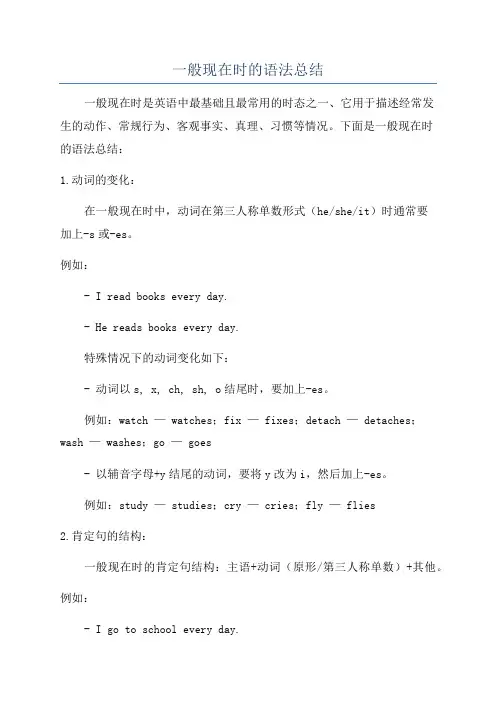
一般现在时的语法总结一般现在时是英语中最基础且最常用的时态之一、它用于描述经常发生的动作、常规行为、客观事实、真理、习惯等情况。
下面是一般现在时的语法总结:1.动词的变化:在一般现在时中,动词在第三人称单数形式(he/she/it)时通常要加上-s或-es。
例如:- I read books every day.- He reads books every day.特殊情况下的动词变化如下:- 动词以s, x, ch, sh, o结尾时,要加上-es。
例如:watch — watches;fix — fixes;detach — detaches;wash — washes;go — goes- 以辅音字母+y结尾的动词,要将y改为i,然后加上-es。
例如:study — studies;cry — cries;fly — flies2.肯定句的结构:一般现在时的肯定句结构:主语+动词(原形/第三人称单数)+其他。
例如:- I go to school every day.- She reads books in the library.3.否定句的结构:一般现在时的否定句结构:主语 + do/does + not + 动词原形(第三人称单数要加s)+ 其他。
例如:- I do not go to school on Sundays.- She does not read books in the library.4.疑问句的结构:一般现在时的疑问句结构:Do/Does + 主语 + 动词原形(第三人称单数要加s)+ 其他?例如:- Do you go to school every day?- Does she read books in the library?5.特殊疑问句的结构:一般现在时的特殊疑问句结构:疑问词 + do/does + 主语 + 动词原形(第三人称单数要加s)+ 其他?例如:- What do you do every day?- Why does she read books in the library?6.时间状语词:在一般现在时句子中,可以使用各种时间状语来说明动作发生的时间,常用的时间状语词有:- always(总是)- frequently(经常)- usually(通常)- often(常常)- seldom(很少)- never(从不)- every day/week/month/year(每天/每周/每月/每年)- on Sundays/Mondays/etc.(在星期天/星期一/等等)7.习惯和常态:一般现在时用于描述习惯、常态和客观事实的情况。
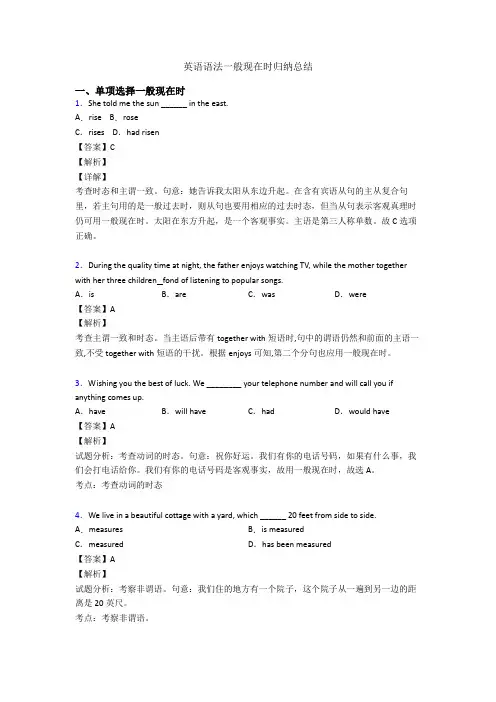
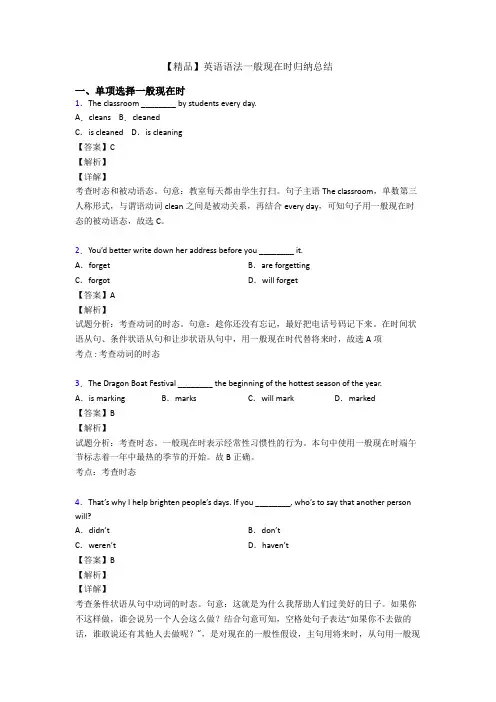
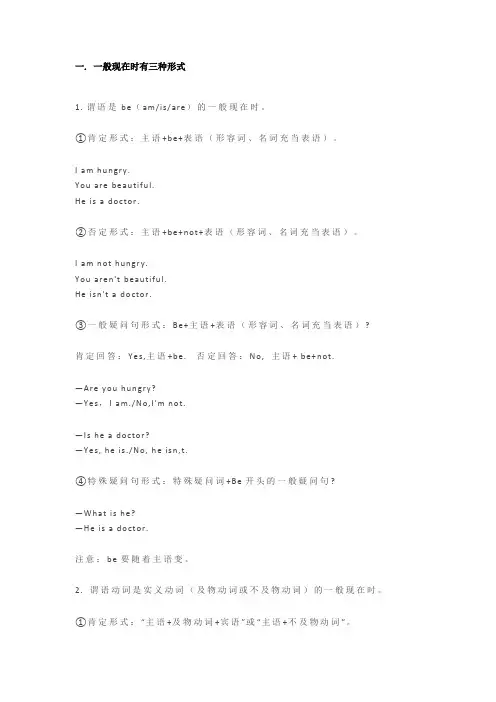
一.一般现在时有三种形式1. 谓语是be(am/is/are)的一般现在时。
①肯定形式:主语+be+表语(形容词、名词充当表语)。
I am hungry.You are beautiful.He is a doctor.②否定形式:主语+be+not+表语(形容词、名词充当表语)。
I am not hungry.You aren't beautiful.He isn't a doctor.③一般疑问句形式:Be+主语+表语(形容词、名词充当表语)?肯定回答:Yes,主语+be. 否定回答:No, 主语+ be+not.—Are you hungry?—Yes,I am./No,I'm not.—Is he a doctor?—Yes, he is./No, he isn,t.④特殊疑问句形式:特殊疑问词+Be开头的一般疑问句?—What is he?—He is a doctor.注意:be要随着主语变。
2. 谓语动词是实义动词(及物动词或不及物动词)的一般现在时。
①肯定形式:“主语+及物动词+宾语”或“主语+不及物动词”。
She has a little brother.她有一个弟弟。
The sun rises in the east.太阳从东方升起。
②否定形式:“主语+don't/doesn't+及物动词+宾语”或“主语+don't/doesn't+不及物动词”。
She doesn't have a little brother.她没有弟弟。
I don't eat every morning.我每天早晨都不吃饭。
③一般疑问句形式:“Do/Does+主语+及物动词原形+宾语”或“Do/Does+主语+不及物动词原形”。
肯定回答:Yes,主语+do/does. 否定回答是:No, 主语+ don't/doesn't.—Do you eat every morning?—Yes, I do./No, I don't.—Does she have a little brother?—Yes, she does./No, she doesn't.④特殊疑问句:特殊疑问词+do/does开头的一般疑问句?What do you like?When do you go to school?注意:根据主语确定用do还是does。
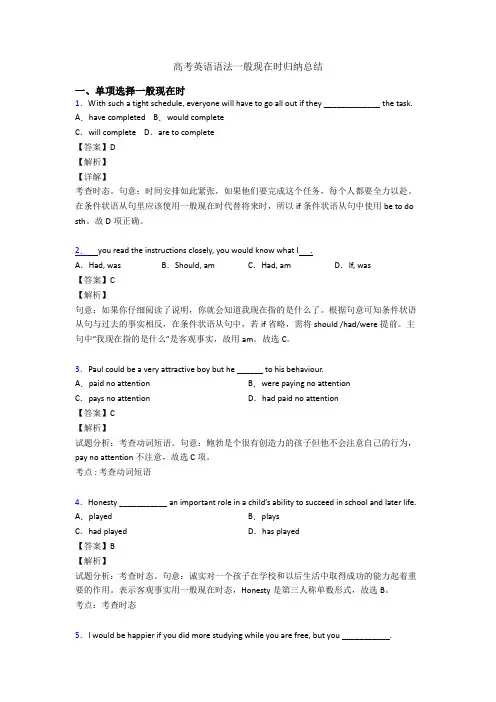
高考英语语法一般现在时归纳总结一、单项选择一般现在时1.With such a tight schedule, everyone will have to go all out if they _____________ the task. A.have completed B.would completeC.will complete D.are to complete【答案】D【解析】【详解】考查时态。
句意:时间安排如此紧张,如果他们要完成这个任务,每个人都要全力以赴。
在条件状语从句里应该使用一般现在时代替将来时,所以if条件状语从句中使用be to do sth。
故D项正确。
2. you read the instructions closely, you would know what I .A.Had, was B.Should, am C.Had, am D.If, was【答案】C【解析】句意:如果你仔细阅读了说明,你就会知道我现在指的是什么了。
根据句意可知条件状语从句与过去的事实相反,在条件状语从句中,若if省略,需将should /had/were提前。
主句中“我现在指的是什么”是客观事实,故用am。
故选C。
3.Paul could be a very attractive boy but he ______ to his behaviour.A.paid no attention B.were paying no attentionC.pays no attention D.had paid no attention【答案】C【解析】试题分析:考查动词短语。
句意:鲍勃是个很有创造力的孩子但他不会注意自己的行为,pay no attention不注意,故选C项。
考点 : 考查动词短语4.Honesty ___________ an important role in a child’s ability to succeed in school and later life. A.played B.playsC.had played D.has played【答案】B【解析】试题分析:考查时态。
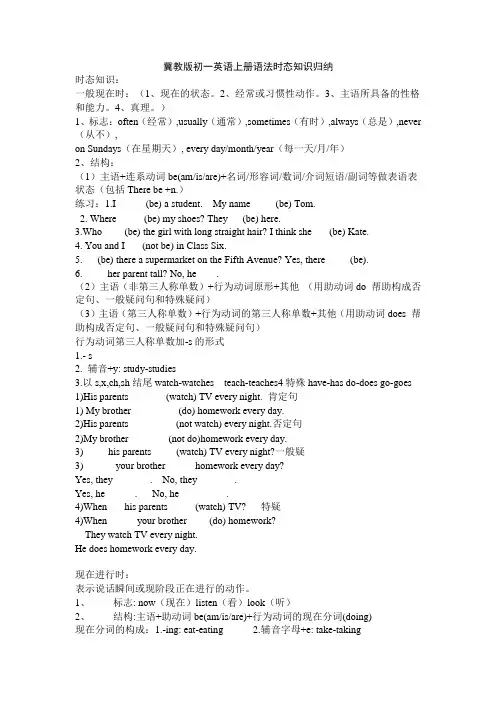
冀教版初一英语上册语法时态知识归纳时态知识:一般现在时:(1、现在的状态。
2、经常或习惯性动作。
3、主语所具备的性格和能力。
4、真理。
)1、标志:often(经常),usually(通常),sometimes(有时),always(总是),never (从不),on Sundays(在星期天), every day/month/year(每一天/月/年)2、结构:(1)主语+连系动词be(am/is/are)+名词/形容词/数词/介词短语/副词等做表语表状态(包括There be +n.)练习:1.I______(be) a student. My name_____(be) Tom.2. Where _____(be) my shoes? They___(be) here.3.Who ____(be) the girl with long straight hair? I think she ___(be) Kate.4. You and I ___(not be) in Class Six.5.___(be) there a supermarket on the Fifth Avenue? Yes, there_____(be).6. ____ her parent tall? No, he____.(2)主语(非第三人称单数)+行为动词原形+其他(用助动词do 帮助构成否定句、一般疑问句和特殊疑问)(3)主语(第三人称单数)+行为动词的第三人称单数+其他(用助动词does 帮助构成否定句、一般疑问句和特殊疑问句)行为动词第三人称单数加-s的形式1.- s2. 辅音+y: study-studies3.以s,x,ch,sh结尾watch-watches teach-teaches4特殊have-has do-does go-goes 1)His parents _______(watch) TV every night. 肯定句1) My brother _________(do) homework every day.2)His parents _________(not watch) every night.否定句2)My brother________(not do)homework every day.3)_____his parents_____(watch) TV every night?一般疑3)______ your brother _____ homework every day?Yes, they _______. No, they _______.Yes, he______. No, he _________.4)When___ his parents _____(watch) TV? 特疑4)When _____ your brother ____(do) homework?They watch TV every night.He does homework every day.现在进行时:表示说话瞬间或现阶段正在进行的动作。
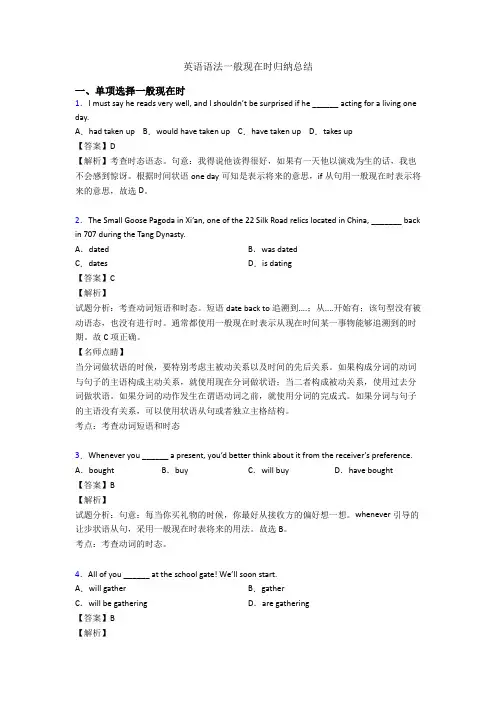
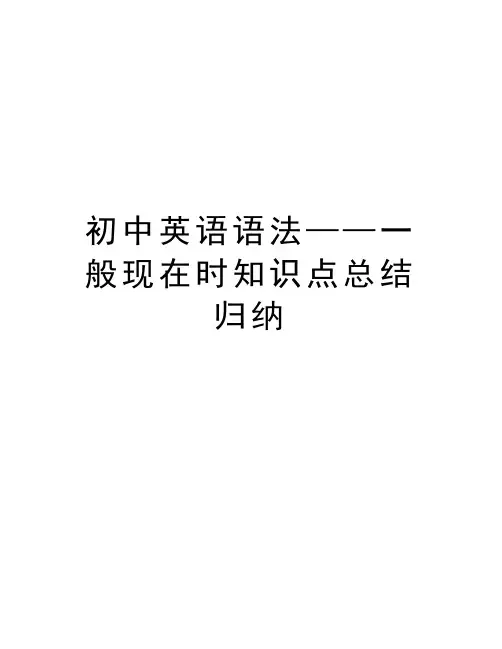
初中英语语法——一般现在时知识点总结归纳初中英语语法——一般现在时知识点总结归纳一般现在时——表示一般性,经常性的动作或一般性事实。
概念:表示经常发生的动作或经常存在的状态。
常和 always , often , usually , sometimes , every day 等表时间的状语连用。
如:1) I go to school every day . 我每天都去学校。
(表经常)2) He is always like that . 他总是那样。
(表状态)构成:1) 主语 + be (am / are / is ) +……2) 主语 + 实义动词/三单动词+ …【解析】1、含有be动词的句子He is a teacher.The girl is very beautiful.Tim and Jack are students.★变疑问句将be动词移到句首Is he a teacher?Is the girl very beautiful?Are Tim and Jack students?★变否定句在be动词后面加notHe is not a teacher.The girl is not very beautiful.Tim and Jack are not students.★肯定回答及否定回答Yes, he is. / No, he is not.Yes, she is. / No, she is not.Yes, they are. / No, they are not.2、不含有be动词的句子,即含有一般动词的句子。
(1)第三人称单数及单数名词He likes books.She likes him.The dog likes bones.★变疑问句在句首加does, 动词变为原型Does he like books?Does she like him?Does the dog like bones?★变否定句在主语及动词之间加doesn't, 动词变为原型,原句中的动词不再有第三人称变化。
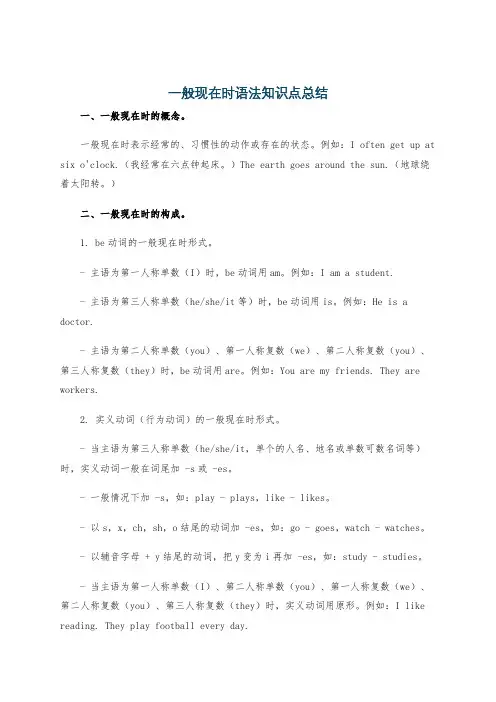
一般现在时语法知识点总结一、一般现在时的概念。
一般现在时表示经常的、习惯性的动作或存在的状态。
例如:I often get up at six o'clock.(我经常在六点钟起床。
)The earth goes around the sun.(地球绕着太阳转。
)二、一般现在时的构成。
1. be动词的一般现在时形式。
- 主语为第一人称单数(I)时,be动词用am。
例如:I am a student.- 主语为第三人称单数(he/she/it等)时,be动词用is。
例如:He is a doctor.- 主语为第二人称单数(you)、第一人称复数(we)、第二人称复数(you)、第三人称复数(they)时,be动词用are。
例如:You are my friends. They are workers.2. 实义动词(行为动词)的一般现在时形式。
- 当主语为第三人称单数(he/she/it,单个的人名、地名或单数可数名词等)时,实义动词一般在词尾加 -s或 -es。
- 一般情况下加 -s,如:play - plays,like - likes。
- 以s,x,ch,sh,o结尾的动词加 -es,如:go - goes,watch - watches。
- 以辅音字母 + y结尾的动词,把y变为i再加 -es,如:study - studies。
- 当主语为第一人称单数(I)、第二人称单数(you)、第一人称复数(we)、第二人称复数(you)、第三人称复数(they)时,实义动词用原形。
例如:I like reading. They play football every day.三、一般现在时的用法。
1. 表示经常或习惯性的动作。
- 常与表示频率的副词或短语连用,如:always(总是),usually(通常),often(经常),sometimes(有时),seldom(很少),never(从不),every day (每天),once a week(每周一次)等。
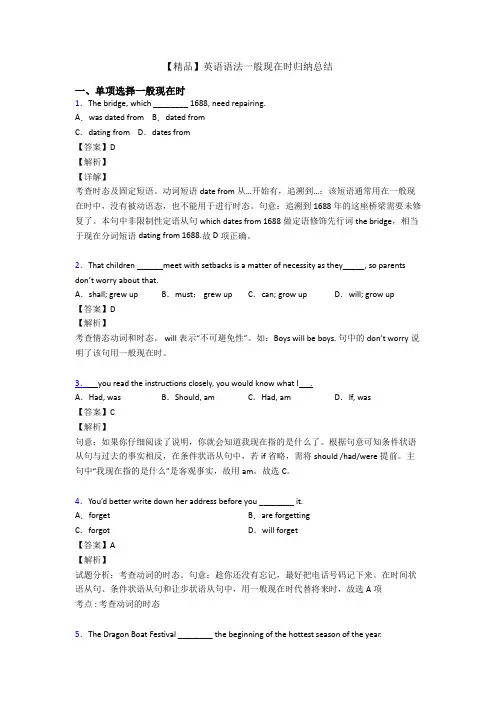
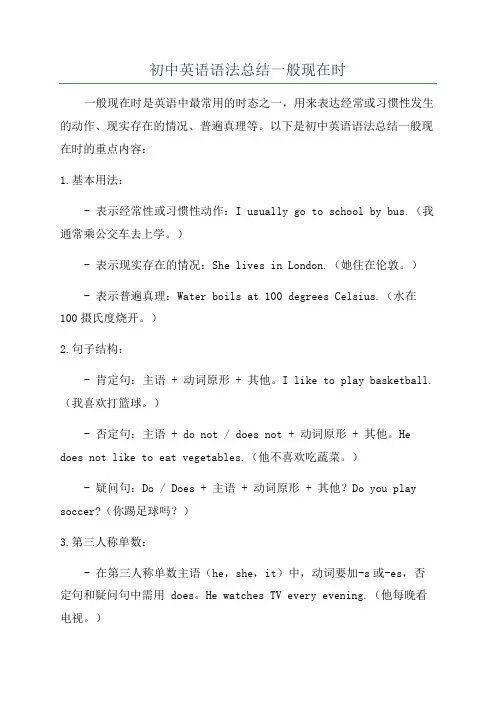
初中英语语法总结一般现在时一般现在时是英语中最常用的时态之一,用来表达经常或习惯性发生的动作、现实存在的情况、普遍真理等。
以下是初中英语语法总结一般现在时的重点内容:1.基本用法:- 表示经常性或习惯性动作:I usually go to school by bus.(我通常乘公交车去上学。
)- 表示现实存在的情况:She lives in London.(她住在伦敦。
)- 表示普遍真理:Water boils at 100 degrees Celsius.(水在100摄氏度烧开。
)2.句子结构:- 肯定句:主语 + 动词原形 + 其他。
I like to play basketball.(我喜欢打篮球。
)- 否定句:主语 + do not / does not + 动词原形 + 其他。
He does not like to eat vegetables.(他不喜欢吃蔬菜。
)- 疑问句:Do / Does + 主语 + 动词原形 + 其他?Do you play soccer?(你踢足球吗?)3.第三人称单数:- 在第三人称单数主语(he,she,it)中,动词要加-s或-es,否定句和疑问句中需用 does。
He watches TV every evening.(他每晚看电视。
)- 一些以s, sh, ch, x, o结尾的单词,需要在动词后加-es,如:misses,washes,watches。
4.频率副词:- 频率副词通常放在动词之前,用于修饰动词。
例如:She always helps others.(她总是帮助别人。
)5.现在进行时与一般现在时的区别:- 现在进行时表示现在正在发生的动作,一般与现在时间状语连用,或表示现阶段的临时情况。
例如:I am studying for the exam.(我正在准备考试。
- 一般现在时表示经常性、习惯性的动作或客观存在的状态。
例如:I usually play soccer on weekends.(我通常在周末踢足球。
六年级英语一般现在时语法知识归纳(最新8篇). 句子成分篇一1.主语:句子所陈述的对象。
2.谓语:主语发出的动作。
一般是有动作意义的动词。
3. 宾语:分为动词宾语和介词宾语,属于动作的承受者。
4. 系动词:表示状态或状态变化的动词,没有实际的动作意义。
如 be,感官系动词(look, sound, smell, taste 和 feel)、保持类系动词(keep, stay 和 remain)、状态变化类系动词(become、get、turn 和 go)等。
5. 表语:紧跟系动词后面的成分。
6. 定语:修饰名词或代词的成分。
7. 状语:修饰形容词、副词、动词或句子的成分。
8. 补语:分为宾语补足语和主语补足语。
是对宾语和主语的补充说明,与其有主动或被动的逻辑关系。
例如:You should keep the room clean and tidy.你应该让屋子保持干净整洁。
(You是主语, should keep是谓语,the room是宾语,clean and tidy 是宾语补足语。
)This kind of food tastes delicious.这种食物吃起来很可口。
(This kind of food是主语, tastes是系动词, delicious是表语。
)注意:主语、谓语、宾语、系动词、表语、补语是一个句子的主干成分;定语和状语是一个句子的修饰性成分,不是主干成分。
六年级英语一般现在时语法知识归纳篇二所介绍的是一般现在时,一般现在时(Simplepresenttense)。
表示通常性、规律性、习惯性、真理性的状态或者动作(有时间规律发生的事件)的一种时间状态。
(1)句中be动词和动词一般情况下只能有一种而且也必须有一种。
如:The children are very happy on Christmas Day.She often does some house work atthe weekend.(2)一般现在时中的be动词:一般用原形:amisaream用于第一人称单数(I);is用于第三人称单数(hesheit和其他人名或称谓,如:Benhissister等);are用于第二人称单数(you)和所有复数(包括第一人称复数we、第二人称复数you;第三人称复数they和其他复数,如the children、his parents等)。
高考英语语法一般现在时归纳总结一、单项选择一般现在时1.The Spring Festival is the time of year that _____ the largest annual mass migration on the planet when one sixth of the world’s population _____ home.A.will see; travels B.saw; was travellingC.will be seeing; will be travelling D.sees; travel【答案】D【解析】考查动词的时态。
句意:每年的春节是这个星球上最大的年度大规模迁徙的时候,在那个时候,全球人口的六分之一旅行回家。
see“见证”作定语从句中的谓语,that指代先行词year,先行词是第三人称单数,与谓语动词see是主动关系,句子讲述客观事实用一般现在时,故第一空填sees;分数或者百分数修饰名词作主语,谓语动词与所修饰的名词保持人称和数的一致,根据语境可知,population此处表示“人们”是复数,文章描述现在存在的事实用一般现在时,故第二空填travel。
故选D。
2.During the quality time at night, the father enjoys watching TV, while the mother together with her three children fond of listening to popular songs.A.is B.are C.was D.were【答案】A【解析】考查主谓一致和时态。
当主语后带有together with短语时,句中的谓语仍然和前面的主语一致,不受together with短语的干扰。
根据enjoys可知,第二个分句也应用一般现在时。
3. you read the instructions closely, you would know what I .A.Had, was B.Should, am C.Had, am D.If, was【答案】C【解析】句意:如果你仔细阅读了说明,你就会知道我现在指的是什么了。
一般现在时总结归纳现在时态是英语语法中最常用的时态之一,用来描述目前正在发生或经常发生的动作、状态或真理。
在本文中,我们将对一般现在时进行总结归纳,并提供一些例句和常用短语。
一、一般现在时的基本结构一般现在时的基本结构为主语 + 动词的原形。
当主语是第三人称单数时,需要在动词后加上-s或-es。
例如:1. I study English every day.(我每天学习英语。
)2. He works in a big company.(他在一家大公司工作。
)二、用法总结一般现在时有以下四种基本用法:1. 表示经常性的动作或习惯例如:- She always takes a walk in the park after dinner.(她每天晚饭后都去公园散步。
)- They usually go swimming on weekends.(他们通常在周末去游泳。
)2. 表示客观事实、普遍真理或科学事实例如:- The sun rises in the east.(太阳从东方升起。
)- Water boils at 100 degrees Celsius.(水在摄氏100度时沸腾。
)3. 表示现阶段的状态例如:- I live in Beijing.(我住在北京。
)- The book belongs to me.(这本书属于我。
)4. 表示评论和说话者的观点例如:- It seems that you are right.(看起来你是对的。
)- The movie is interesting.(这部电影很有趣。
)三、时间状语和频率副词在使用一般现在时时,可以借助时间状语和频率副词来更准确地表达时间和频率。
以下是一些常用的时间状语和频率副词:1. 时间状语- every day(每天)- on Sundays(在周日)- in the morning(在早上)- at night(在晚上)- at present(目前)- now(现在)- this week(这周)2. 频率副词- always(经常)- usually(通常)- often(经常)- sometimes(有时)- rarely(很少)- never(从不)例如:- I often go shopping on weekends.(我经常在周末去购物。
最新一般现在时知识点总结(word)1一、一般现在时1.Bill often soccer after school, but this afternoon he because it was snowy.A. play; doesn'tB. plays; wasn'tC. plays; didn'tD. play; didn't【答案】 C【解析】【分析】often经常,是频度副词,通常用在一般现在时中,主语Bill是第三人称,故动词用单三形式,play的单三形式plays,故先排除A,D。
句子后面有was,可判断是一般过去时he后面省略了前半句中提到的play soccer,play是动词,否定要借助于助动词,故选C。
【点评】时态的判断。
2.I don't know if he tomorrow. If he , I'll call you at once.A. comes, comesB. will come; comesC. will come, will come【答案】 B【解析】【分析】句意:我不知道他明天是否回来。
如果他来,我会马上打电话给你。
第一个空,根据tomorrow,可知宾语从句是时态是一般将来时,第二个空是if 引导的条件状语从句,时态是主将从现,故此处是一般现在时,故选B。
【点评】考查宾语从句,注意一般将来时的用法。
3.—I don't know if it tomorrow.—Well, if it , the school sports meeting will be cancelled.A. will rain;will rainB. rains;will rainC. will rain;rains【答案】 C【解析】【分析】句意:——我不知道明天会不会下雨。
——如果下雨,学校运动会将被取消。
第一个空是if引导宾语从句,tomorrow是一般将来时标志,故用will rain,第二个空是if引导的条件状语从句,时态是主将从现,故从句是一般现在时,主语是it第三人称单数,故谓语动词是单三式rains,故选C。